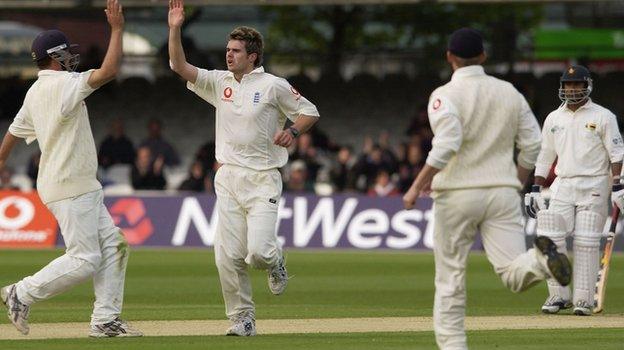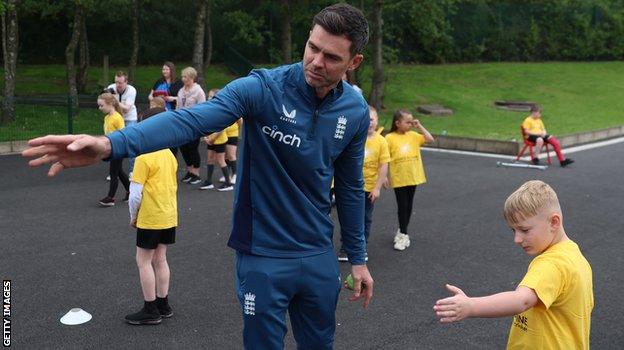James Anderson: England fast bowler reflects on career 20 years after Test debut
- Published

In a career laced with records, landmarks and achievements, James Anderson has hit another milestone.
Monday marks exactly 20 years since England's most prolific fast bowler made his Test debut.
When he has recovered sufficiently from a groin injury to win his next and 180th cap, Anderson will become the first England player since Brian Close in 1976 to extend his Test career into a third decade.
Anderson's journey from that Lord's bow against Zimbabwe in May 2003 has seen him touch heights no other pace bowler in the history of the game has been able to reach - 685 wickets and counting.
He sits third on the all-time Test wicket-takers list, could be second before the summer is out and will end his career knowing he is unlikely to be passed.
Making his debut alongside Yorkshire all-rounder Anthony McGrath, who retired a decade ago, a 20-year-old Anderson was less than a year on from being a regular in the first XI of Burnley Cricket Club.

Zimbabwe's Mark Vermeulen would become James Anderson's first victim in Test cricket
It was back in Burnley, at his old primary school of St Mary's, where Anderson reflected on his early years and rise to international cricket.
"My dad was second team captain at Burnley. He was alright, an all-rounder," Anderson, now 40, tells BBC Sport.
"I'd watch Botham's Ashes on video, then when dad was playing I'd get on to the field at tea, trying to hit some balls from mum.
"I was constantly trying to do impressions or emulate people. If it was football, it would have been one of the Burnley players, or I was a bit of an Arsenal fan, so it would have been Ian Wright.
"In cricket I'd have been trying to bowl like Darren Gough against the garage door."
Burnley Cricket Club, in the shadow of the football club's Turf Moor home, is one of the most successful teams in the notoriously tough Lancashire League.
The young Anderson would return year on year, a little taller and a little quicker each time. He made his first-team debut as a 15-year-old in the early part of the 1998 season.
"It was very hard cricket," says Anderson. "In one of my first games I bowled five wides in the first over and thought 'this is never going to end'. I soon learned, at 15, that nerves are good. They brought the best out of me. That stood me in good stead."
The Lancashire League is famous for its overseas professionals - Shane Warne at Accrington, Jason Gillespie at Rishton and Michael Clarke at Ramsbottom to name a few - and it was Anderson's big-name scalps that caught the eye.
In that debut season, Anderson had Roger Harper, the all-rounder who played for the great West Indies side of the 1980s and early 90s, caught behind for a golden duck.
The following season, South Africa batter Martin van Jaarsveld was only three years away from playing Test cricket, but still bounced out first ball by the 17-year-old Anderson.
"That was when I first started thinking I could play at that level," says Anderson. "When I was getting quality players out, it made me feel like I could do the job.
"I bounced Van Jaarsveld and he got caught at mid-on. I would never have thought to bounce someone first ball, but the captain said 'he will not be expecting this' - you learn lessons all the way through."
It was Val Brown, the mother of Burnley team-mate Michael, who recommended Anderson to Lancashire academy coach John Stanworth.
"Val Brown generally used to stay in the background so for her to bring Jimmy to my attention was quite powerful," Stanworth told the BBC in 2015.
Anderson's List A debut came in 1999 against a Suffolk side containing Derek Randall, the batter who played for England in the 1970s, but it took three years of Lancashire second team cricket before he made a real impression - 8-54 against the Northants second string in May 2002.
A week later, he made his County Championship debut and, by the end of the year, was in the England one-day squad.
"I remember that year well," says Anderson, who started the summer playing 10 Lancashire League games for Burnley.
"When I took eight wickets, Neil Fairbrother was playing for the Lancashire second team and recommended I was put in the first team.
"I got sent to the England Academy in Australia and, when all of the fast bowlers got injured, I was in the right place at the right time."
Whereas in the June Anderson had been returning figures of 1-27 at Haslingden for Burnley, by December he was opening the bowling in a one-day international against Australia at the Melbourne Cricket Ground.
He did enough to earn a spot at the 2003 World Cup, where he famously tore through the Pakistan top order in Cape Town, and was a shoo-in for a Test debut the following summer.
With frosted tips in his hair (not the worst hairstyle of his career), Anderson took the ball late on the second day and bowled Mark Vermeulen for his first Test wicket, claiming 5-73 to set England on course for victory by an innings.
"I can't believe I'm still doing what I'm doing. I feel fortunate and blessed to have had the career that I've had. I feel fortunate that I've not been blighted too much with injuries," says Anderson.

James Anderson coaches pupils at his former primary school
The opportunity to reflect at St Mary's came as part of a Chance To Shine schools visits, where Anderson led a coaching session and took questions from children ("Do you like karaoke? No. What would you do if you won the lottery? Buy Burnley FC. What's the silliest thing you've done? Put a red stripe in my hair).
Through partnerships with Chance to Shine and the Lord's Taverners, the England and Wales Cricket Board is investing more than £4m this year to take cricket to around 7,500 primary schools and 700,000 children.
For the first time, a targeted programme will reach 55,000 children from under-served communities, and those attending special educational needs and disability schools.
It is a pertinent subject for Anderson, often a minority in an England team as a state-educated player surrounded by those with private-school backgrounds.
"We probably played two or three cricket matches a year in school," he says. "I was really fortunate that my dad played club cricket.
"Trying to give as many kids as possible to play the game is so important. We shouldn't rely on just one route to play international cricket. We need many routes to get there."
As for Burnley, Anderson played his final games for the club in 2006 as a batter when he was recovering from a back injury. He still has the league winners' medal from that season on display in his house.
There is a James Anderson Suite at the club, though the man himself is denied a free drink inside.
"No," he says. "You don't get anything for free in Burnley."